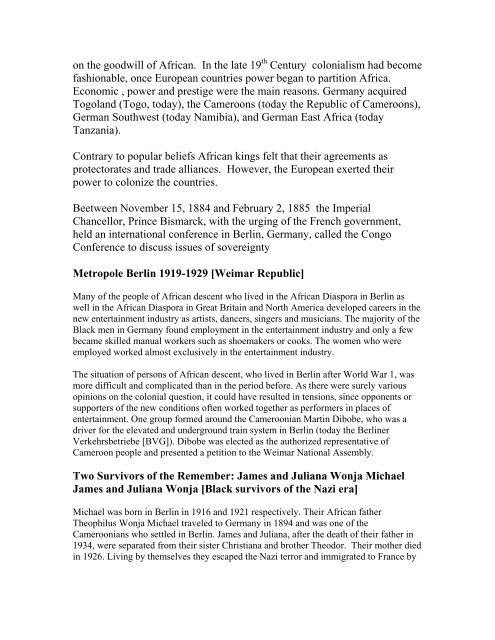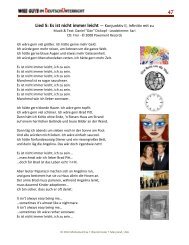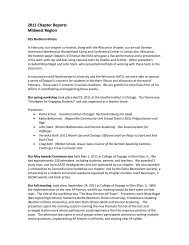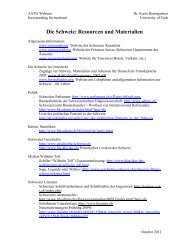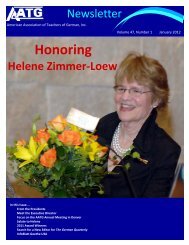Brief history of Africans in Germany Introduction - American ...
Brief history of Africans in Germany Introduction - American ...
Brief history of Africans in Germany Introduction - American ...
Sie wollen auch ein ePaper? Erhöhen Sie die Reichweite Ihrer Titel.
YUMPU macht aus Druck-PDFs automatisch weboptimierte ePaper, die Google liebt.
on the goodwill <strong>of</strong> African. In the late 19 th Century colonialism had become<br />
fashionable, once European countries power began to partition Africa.<br />
Economic , power and prestige were the ma<strong>in</strong> reasons. <strong>Germany</strong> acquired<br />
Togoland (Togo, today), the Cameroons (today the Republic <strong>of</strong> Cameroons),<br />
German Southwest (today Namibia), and German East Africa (today<br />
Tanzania).<br />
Contrary to popular beliefs African k<strong>in</strong>gs felt that their agreements as<br />
protectorates and trade alliances. However, the European exerted their<br />
power to colonize the countries.<br />
Beetween November 15, 1884 and February 2, 1885 the Imperial<br />
Chancellor, Pr<strong>in</strong>ce Bismarck, with the urg<strong>in</strong>g <strong>of</strong> the French government,<br />
held an <strong>in</strong>ternational conference <strong>in</strong> Berl<strong>in</strong>, <strong>Germany</strong>, called the Congo<br />
Conference to discuss issues <strong>of</strong> sovereignty<br />
Metropole Berl<strong>in</strong> 1919-1929 [Weimar Republic]<br />
Many <strong>of</strong> the people <strong>of</strong> African descent who lived <strong>in</strong> the African Diaspora <strong>in</strong> Berl<strong>in</strong> as<br />
well <strong>in</strong> the African Diaspora <strong>in</strong> Great Brita<strong>in</strong> and North America developed careers <strong>in</strong> the<br />
new enterta<strong>in</strong>ment <strong>in</strong>dustry as artists, dancers, s<strong>in</strong>gers and musicians. The majority <strong>of</strong> the<br />
Black men <strong>in</strong> <strong>Germany</strong> found employment <strong>in</strong> the enterta<strong>in</strong>ment <strong>in</strong>dustry and only a few<br />
became skilled manual workers such as shoemakers or cooks. The women who were<br />
employed worked almost exclusively <strong>in</strong> the enterta<strong>in</strong>ment <strong>in</strong>dustry.<br />
The situation <strong>of</strong> persons <strong>of</strong> African descent, who lived <strong>in</strong> Berl<strong>in</strong> after World War 1, was<br />
more difficult and complicated than <strong>in</strong> the period before. As there were surely various<br />
op<strong>in</strong>ions on the colonial question, it could have resulted <strong>in</strong> tensions, s<strong>in</strong>ce opponents or<br />
supporters <strong>of</strong> the new conditions <strong>of</strong>ten worked together as performers <strong>in</strong> places <strong>of</strong><br />
enterta<strong>in</strong>ment. One group formed around the Cameroonian Mart<strong>in</strong> Dibobe, who was a<br />
driver for the elevated and underground tra<strong>in</strong> system <strong>in</strong> Berl<strong>in</strong> (today the Berl<strong>in</strong>er<br />
Verkehrsbetriebe [BVG]). Dibobe was elected as the authorized representative <strong>of</strong><br />
Cameroon people and presented a petition to the Weimar National Assembly.<br />
Two Survivors <strong>of</strong> the Remember: James and Juliana Wonja Michael<br />
James and Juliana Wonja [Black survivors <strong>of</strong> the Nazi era]<br />
Michael was born <strong>in</strong> Berl<strong>in</strong> <strong>in</strong> 1916 and 1921 respectively. Their African father<br />
Theophilus Wonja Michael traveled to <strong>Germany</strong> <strong>in</strong> 1894 and was one <strong>of</strong> the<br />
Cameroonians who settled <strong>in</strong> Berl<strong>in</strong>. James and Juliana, after the death <strong>of</strong> their father <strong>in</strong><br />
1934, were separated from their sister Christiana and brother Theodor. Their mother died<br />
<strong>in</strong> 1926. Liv<strong>in</strong>g by themselves they escaped the Nazi terror and immigrated to France by


